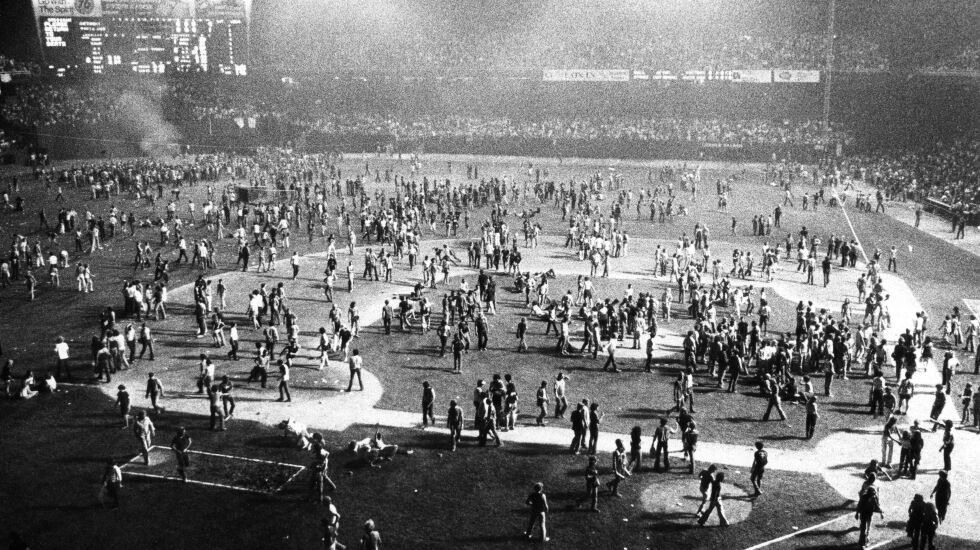
“The theme song seems to be, Disco Sucks. … [This is a] big rock ’n’ roll crowd.” – Harry Caray in the TV booth for the Chicago White Sox on the evening of July 12, 1979.
When the Chicago White Sox hosted the Detroit Tigers for a planned twi-night doubleheader on July 12, 1979, both teams were mucking through mediocre seasons.
The Tigers were 43-44 and 14 games behind the Baltimore Orioles in the AL East Division, while the Sox were 40-48 and 11 games back of the California Angels in the AL West. Even with Sox owner Bill Veeck and his son, the innovative promotions director Mike Veeck, presenting a myriad of gimmicks to get fans into the park, the Sox were averaging a mere 16,2111 per game in ’79.
Ah, but on that particular July night, the official attendance was announced as 47,795 — and there were an estimated 20,000 fans milling around outside old Comiskey Park, with some of them literally climbing their way into the stadium as Game One progressed. All because of one of the most infamous and notorious and eventually controversial promotions in the history of baseball: Disco Demolition Night.
The PBS “American Experience” episode “The War on Disco” engages in a bit of hyperbole with that title, but this is an illuminating look at not only Disco Demolition, but the yearslong buildup to that night, including the rise of the disco movement that started in the Black and gay communities before going mainstream, and the culture wars attached to the music.
Relying on still photos, archival news footage and present-day interviews with journalists, nightclub owners, historians, DJs, artists and a few of the key players who participated in Disco Demolition, this is a valuable slice of 1970s pop culture history.
As the documentary reminds us, the mid-1970s were an unsettling time in America, as we had just exited the disastrous Vietnam War, unemployment was at its highest since 1941, there was a gas shortage and Rust Belt cities were seeing the demise of factories and plants that had provided jobs for generations of workers. Disco music, which first surfaced in places such as the Loft in New York City, allowed people who were often marginalized to dance, to let loose, to feel free.

“[Many] crucial DJs … were gay people,” notes historian Ayana Contreras. “[It] was inextricably linked.” The movement grew quickly in the early and mid-1970s, striking a chord with millions. Says Chicago’s DJ Williams, “The first time I heard soulful disco … it moved me, it changed my life.”
But as historian Jefferson Cowie points out, “What is liberation for one group becomes oppression, or the perception of oppression, for another group.” With the movie and the soundtrack for “Saturday Night Fever” dominating the cultural landscape, and songs such as “I Will Survive” by Gloria Gaynor becoming feminist anthems, it’s not a stretch to posit that some white, working-class people (mostly men) would look at the velvet ropes outside trendy nightclubs, where only the fabulous and the trendy and the beautiful and the fashionable were admitted — and feel resentment.
Nobody was taking away their Pink Floyd or Cheap Trick or their Led Zeppelin or their Black Sabbath, but it must have felt that way to some.
In 1978, Chicago radio station WDAI-FM (94.7) hired a brash young “shock jock” named Steve Dahl away from WABX in Detroit. Ten months later, on Christmas Eve, WDAI abruptly changed formats to disco and fired Dahl. This turned out to be one of the best things that ever happened in Dahl’s storied career, as he was hired three months later to be the morning man at the soon-to-be-legendary WLUP-FM (97.9), where he teamed with Garry Meier
Dahl’s hatred of disco led to him recording the parody song “Do You Think I’m Disco,” which actually hit No. 58 on the Billboard charts, and to regularly mock disco and its fans on his show. (“We have to destroy disco, it’s our job,” says Dahl in an audio clip from his show.)

When the White Sox’s Mike Veeck came up with the idea of Disco Demolition Night, it was a no-brainer to have Dahl lead the charge.
With sportscaster Rich King, former WLUP promotions director Dave Logan and Meier providing context (there’s a clip of Dahl in an interview from a few years back, but he’s not a participant in this episode), “The War on Disco” takes us through the well-documented paces of Disco Demolition Night, which quickly went from celebratory into something darker and even dangerous, as the jarring explosion of thousands of disco records was followed by a swarm of idiots who stormed the field, setting fires, destroying the batting cage and chanting, “DISCO SUCKS!” (As I’ve mentioned before, I was there that night, in the right-field upper deck, and like the majority of fans, I stayed in my seat.)

From a 2023 viewpoint, there’s no denying the undercurrent of bigotry and ignorance behind the anti-disco movement, though I don’t believe Dahl and most of his fans embraced such stupidity. In any case, as the doc points out, disco had been overexposed by the late 1970s. (When you reach the point where Ethel Merman is doing a disco album, you’ve lost your hip edge.)
Still, you can’t call disco a fad, not when songs such as “Disco Inferno,” “Last Dance,” “Stayin’ Alive,” “September,” “Le Freak,” “Don’t Stop ’Til You Get Enough” and “Young Hearts Run Free” still make us want to get up and dance some 40 years down the road. If there really was a war on disco, disco won.







